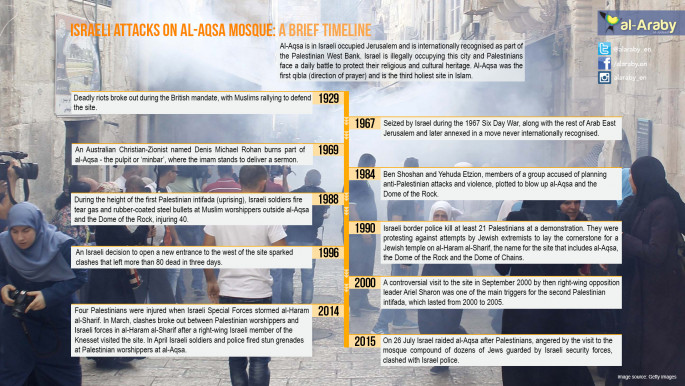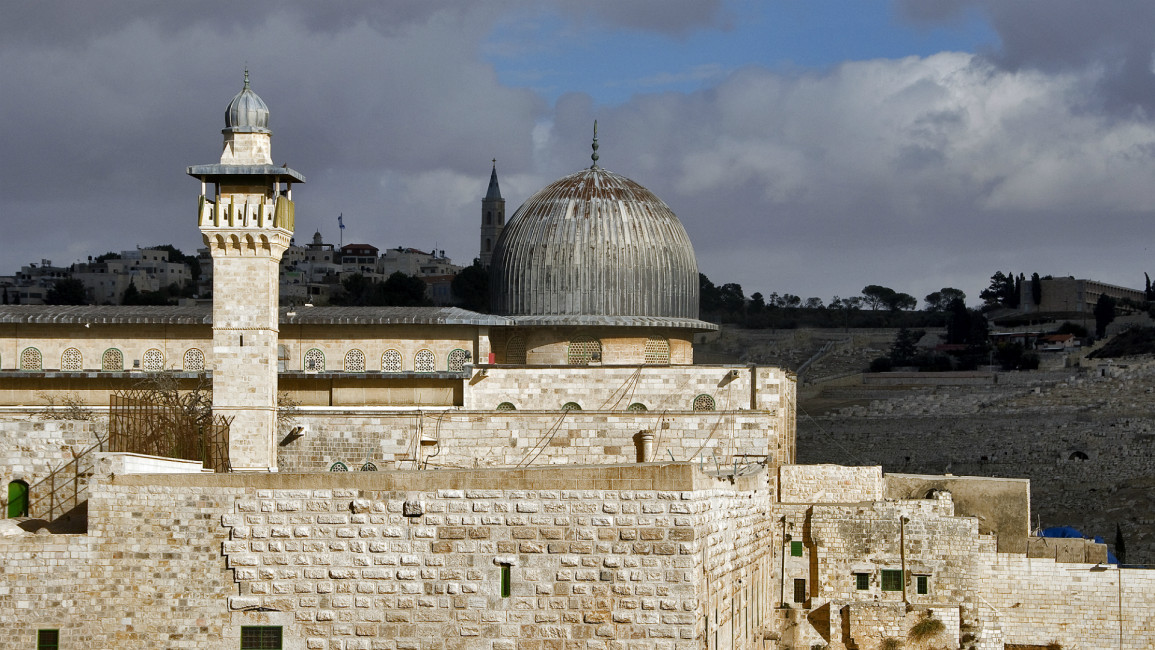Israel 'blocking' installation of al-Aqsa cameras
An Islamic trust which administers Jerusalem's flashpoint al-Aqsa mosque compound has accused the Israeli police of blocking the installation of cameras on Monday, a key measure agreed to defuse Israeli-Palestinian tensions over the holy site.
The Jordanian-run trust said a team was "working on the installation of cameras belonging to the Islamic Waqf... but the Israeli police interfered directly and stopped the work."
"We severely condemn the Israeli interference into the working affairs of the Waqf, and we consider the matter evidence that Israel wants to install cameras that only serve its own interests, not cameras that show truth and justice," it said in a statement.
Israeli police had no immediate comment.
 |
|
| [Click to enlarge] |
Mixed response over surveillance
An intense diplomatic drive to ease tensions resulted in Jordan and Israel agreeing Saturday on the installation of surveillance cameras at the mosque, with Jordan's Foreign Minister Nasser Judeh saying technical teams from both sides would be meeting to work out the details.
Israeli Prime Minister Binyamin Netanyahu vowed Jews would still be allowed to visit but not pray at the compound, agreeing to 24-hour surveillance cameras to be installed and adding these were in Israel's interest.
"Firstly, to refute the claim Israel is violating the status quo. Secondly, to show where the provocations are really coming from, and prevent them in advance," he said.
Israel's Defence Minister Moshe Yaalon said that currently cameras film the outside plaza of the compound, but not the interiors of its shrines.
Jordanian King Abdullah II welcomed Netanyahu's pledge "on condition that it is implemented".
He said he was convinced this would "put an end to violence, calm tension and I hope it will contribute to reviving efforts to resolve the fundamental questions through negotiations".
US Secretary of State John Kerry said Saturday that the cameras would be a "game changer in discouraging anybody from disturbing the sanctity of the holy site".
A 'new trap'
But Palestinians were unmoved.
"This is a new trap," Foreign Minister Riyad al-Maliki said on Voice of Palestine radio, accusing Israel of planning to use such footage to arrest Muslim worshippers it believes are "inciting" against it.
Palestinians have already expressed anger and concern over what they see as excessive use of force by Israeli police and soldiers. Israel says it is justified in using lethal force to meet deadly threats.
"There will not be calm without political prospects to definitively end the occupation," said Nabil Shaath, an official from Palestinian president Mahmoud Abbas' West Bank-based Fatah.
Palestinians want the status quo to revert to what it was in 2000, when Jordan controlled access and not Israel, which regularly imposes restrictions on Muslim visits.
Ties between Israel and Jordan have often been strained by events at the site in East Jerusalem, a majority Palestinian area seized by Israel during the 1967 Six-Day War and later annexed in a move never internationally recognised.
Under terms of a 1994 peace treaty, Jordan is recognised as custodian of the al-Aqsa compound but Israel controls access.
Considered the third holiest site in Islam, and revered by Jews as their holiest site, known as Temple Mount, the compound is a crucible of tensions in the Israeli-Palestinian conflict.
Clashes at the site broke out in September between Israeli police and Palestinians who accuse the Jewish state of seeking to change the rules governing the compound to allow Jews to pray there, which is currently not allowed.
At least 54 Palestinians and one Israeli Arab have been killed by Israeli police in violent clashes with some alleged to be "attackers".
 |
|
| [Click to enlarge] |



